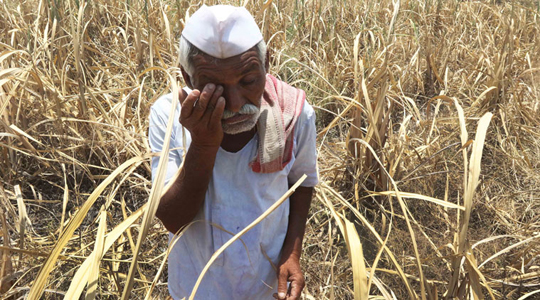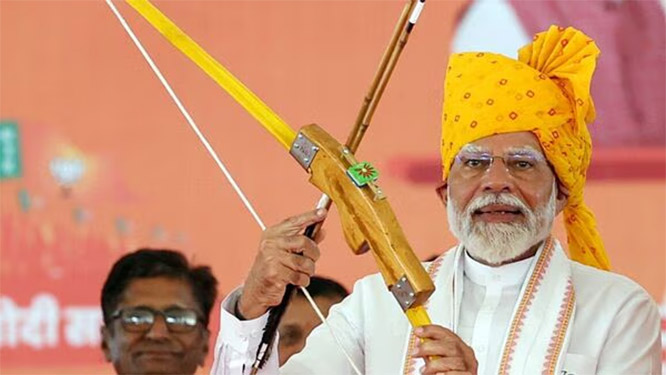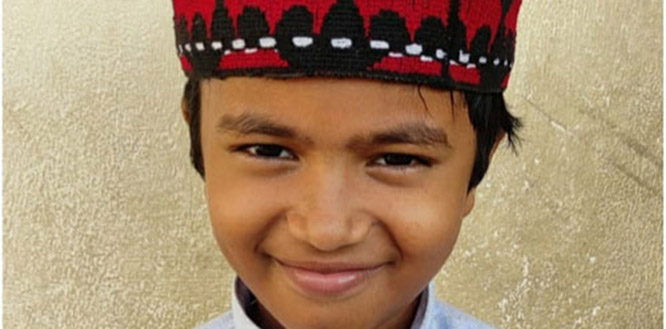The union government’s ban on sale and purchase of cattle for slaughter in open markets across the country is likely to worsen the woes of farmers for whom sale of cattle was one of the ways to overcomes financial difficulties.

Terming the Centre’s move as an assault on agriculture, the farmers’ unions have said that enacting such stringent rules to regulate sale of cattle will push farmers further into debt. As per new rules, sale of cattle including bulls, cows, bullocks, buffaloes, steers, heifers, calves and camels, for purpose of slaughter is punishable offense. The cattle can be sold only to agriculturists.
Vijoo Krishnan, national joint secretary of the All India Kisan Sabha, said in times of drought, selling of cattle was an important way through which the farmers managed financial distress. While the government may say that sale of cattle for slaughter outside the markets are still legal, the bare fact was that most such sale happens within the market places as farmers may not have the means to transport cattle over long distances.
“To say you cannot sell the cattle for six months from the date of purchase or cannot sell infirm cattle will cripple the farmer in a drought situation,” he added.
Krishnan said in many states, restrictions on cow sale have forced the farmers to let the animals loose as they could not afford fodder in times of distress. “Take the case of Tamil Nadu, which is facing severe drought. When farmers cannot feed themselves, how do you expect them to feed an infirm cattle?” he asked.
He added that if the Centre wants farmers not to sell infirm cattle, it should make arrangements to procure and take care of them.
The rules also provide for extensive paper rules. When a cattle is sold, five copies of the sale documents should be made and filed with relevant officers for future verification. Authorities also have the powers to seize and animal and detain it in a separate enclosure if the animal is found to be unfit for sale by a veterinarian.
Krishnan added that in a context where self-proclaimed cow protectors are unleashing violence across the country, such rules may pose a serious threat of security of farmers. “These rules could lead to mob regulations,” he alleged.
Rigid rules
The rules stated that a cattle bought cannot be resold for a period of six months. The purchaser has to produce his name and address to the market committee and the officials have the right to inspect the person’s premises to ensure the cattle is not sold for six months from the date of purchase.
Rules are considered subordinate legislations which are framed to ensure the parent law is implemented properly. The Centre has titled the new rules Prevention of Cruelty to Animals Act (Regulation of Livestock Markets) Rules, 2016.
The following are the provisions that govern sale of cattle under the new rules:
“(a) no person shall bring to an animal market a young animal;
(b) no person shall bring a cattle to an animal market unless upon arrival he has furnished a written declaration signed by the owner of the cattle or his duly authorised agent—
(i) stating the name and address of the owner of the cattle, with a copy of the photo identification proof ;
(ii) giving details of the identification of the cattle;
(iii) stating that the cattle has not been brought to market for sale for slaughter;
(c) every declaration furnished to the Animal Market Committee shall be retained by it for a period of six months from the date on which it is furnished to them and the Animal Market Committee shall, on demand made by an Inspector at any reasonable time during that period, produce such declaration and allow a copy of it or an extract from it to be taken;
(d) where an animal has been sold and before its removal from the animal market, the Animal Market Committee shall—(i) obtain the expenses incurred for each animal, as approved by the District Animal Market Monitoring Committee, so as to provide the basic facilities for animals and people;
(ii) take an undertaking that the animals are bought for agriculture purposes and not for slaughter;
(iii) keep a record of name and address of the purchaser and procure his identity proof;
(iv) verify that the purchaser is an agriculturist by seeing the relevant revenue document;
(v) ensure that the purchaser of the animal gives a declaration that he shall not sell the animal up to six months from the date of purchase and shall abide by the rules relating to transport of animals made under the Act or any other law for the time being in force;
(vi) retain such record for a period of six months from the date of sale;
(vii) produce such record before an Inspector on demand being made by him at any reasonable time during that period and allow a copy of it or an extract from it to be taken;”
The rules are the result of a Supreme Court direction last year. The court, acting on petitions filed by animal rights activists, asked the Centre to regulate cattle trade.
Officials at the Animal Welfare Board of India said on condition of anonymity that the rules do not ban slaughter of all cattle. Rather, it only regulates the sale of cattle in markets. In case someone wants to sell the cattle for slaughter, it could be done legally outside the markets subject to slaughter rules implemented the respective states.
It is unclear what are the other locations where sales can take place outside animal markets. India has about 3,900 slaughter houses licensed by local bodies, according to a planning commission report for 2007-’12. The total cattle population in India is 190 million, according to the 2012 livestock census. Animal markets have traditionally acted as a conduit between the farmers and the butchers.
In most states except Kerala and in the north-east, slaughter of cows is banned. Ever since the Bharatiya Janata Party government took over in May 2014, there have been several incidents of cow vigilantes indulging in violence against those suspected to be selling cows or eating cow meat.








Comments
Add new comment